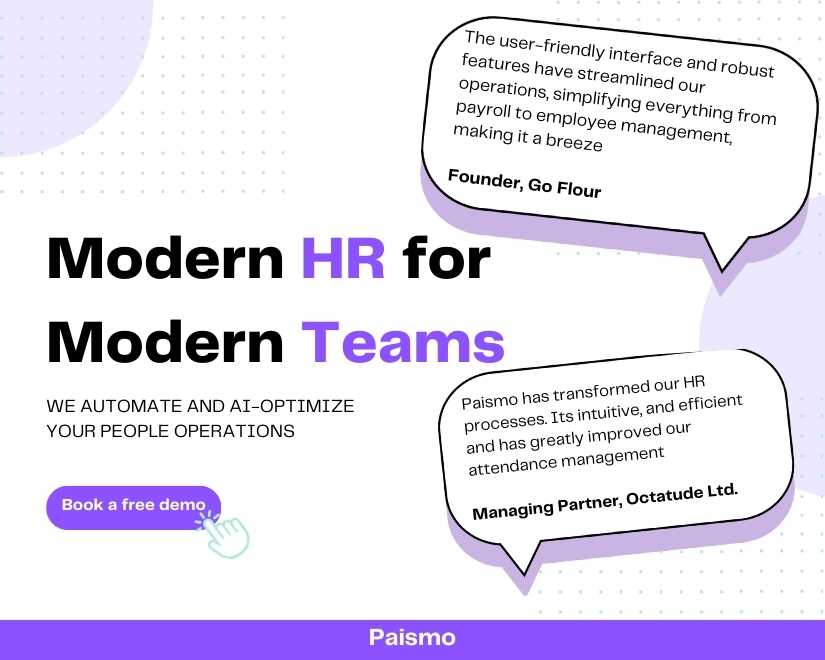Highlights
- Emotional intelligence tests enable employers to assess how effectively candidates work in teams, manage stress, communicate, and lead.
- Utilizing HR automation and innovative tools facilitates easier and more organized tracking of candidates and EQ assessments.
- Developing EQ through self-awareness, self-regulation, empathy, motivation, and social skills improves workplace performance.
- Common EI tests include self-report, ability-based, 360-degree feedback, situational judgment, and appraisal assessments.
- Startups benefit from using these assessments to build cohesive teams, improve workflows, and enhance collaboration.
Hiring the right people goes beyond checking technical skills. Employers also consider how candidates manage stress, communicate effectively with others, and collaborate efficiently. To get a clearer understanding of these abilities, many companies now use an emotional intelligence test. Tools like HR software in UAE help organize applications, while an all in one HR system makes it easier for HR teams to track and compare results.
In this blog, we will cover why emotional intelligence matters in hiring, tips to boost emotional intelligence, and practical ways to improve EQ for career and workplace success.
What Is an Emotional Intelligence Test?

An emotional intelligence test measures how well a person understands and manages their own emotions and responds to others. It evaluates essential skills like self-awareness, empathy, communication, and teamwork. Companies use these tests to support smarter hiring decisions, ensuring candidates are a good fit for teamwork and leadership roles. Some firms also provide an emotional intelligence test free, giving individuals an opportunity to understand their EQ and improve the skills that matter most in the workplace. By using these tests, both candidates and employers can gain clearer insights into behavior, improving workplace fit and performance.
Why Emotional Intelligence Matters in Hiring?
Emotional intelligence is vital for predicting how well someone will perform at work and grow in their career. People with high EQ handle stress calmly, communicate clearly, and get along well with their team. Assessing EQ helps employers improve leadership and build stronger, more effective teams. Some key benefits of using EQ in hiring are:
- Better teamwork and collaboration
- Stronger problem-solving under pressure
- Greater adaptability to change
- More transparent communication and conflict management
The Paismo platform, through its performance suite tool, helps HR teams track emotional intelligence scores along with other employee metrics. This makes it simple to evaluate candidates and manage assessments efficiently.
How to Improve Emotional Intelligence?

Emotional intelligence is a skill anyone can develop with practice. While some people may have a naturally high EQ, everyone can work to improve it over time. Using HR Technology and an EQ emotional intelligence test can help track progress and provide guidance for growth.
Here are some practical ways to boost your emotional intelligence:
- Self-awareness: Notice your emotions and reactions in daily situations. Journaling or brief reflection can help you understand your behavior.
- Self-regulation: Pause before responding and practice calming techniques, such as deep breathing. See challenges as chances to learn.
- Motivation: Recognize small achievements and clarify your purpose. Breaking tasks into smaller steps can make achieving goals easier.
- Empathy: Focus on others’ feelings. Listen carefully, observe interactions, and participate in activities that broaden your perspective.
- Social skills: Engage in conversations, maintain eye contact, and be mindful of your body language. Practicing these in new situations strengthens interpersonal connections.
Consistently applying these strategies can help you manage your emotions more effectively, collaborate more effectively, and develop stronger leadership skills.
Types of Emotional Intelligence Tests Used in Hiring
Common types of emotional intelligence (EI) tests used in recruitment include self-report assessments, ability-based assessments, 360-degree feedback, situational judgment tests (SJTs), and the emotional intelligence appraisal test. These tests measure different aspects of EI through questionnaires, performance-based tasks, and feedback from peers or supervisors.
Common types of EI tests include:
Self-Report Assessments
- How they work: Candidates evaluate their own EI skills through structured questionnaires.
- Examples: Emotional Quotient Inventory (EQ-i 2.0), Trait Emotional Intelligence Questionnaire (TEIQue).
- Pros: Quick and easy to administer.
- Cons: Responses can be influenced by social desirability bias.
- How to use: Use these tests as a first screening to get a sense of a candidate’s self-perceived strengths and weaknesses.
Ability-Based Assessments
- How they work: Measure a candidate’s emotional skills using tasks like identifying emotions or solving emotional problems.
- Examples: Mayer-Salovey-Caruso Emotional Intelligence Test (MSCEIT).
- Pros: Harder to fake; scientifically validated.
- Cons: Scoring is complex and can be costly.
- How to use: Include these tests for roles where problem-solving under pressure and accurate emotional judgment are critical.
360-Degree Assessments
- How they work: Collect feedback from managers, peers, and subordinates to evaluate EI.
- Examples: Emotional & Social Competence Inventory (ESCI), Genos Emotional Intelligence Inventory.
- Pros: Provides a comprehensive perspective.
- Cons: Time-consuming and requires multiple inputs.
- How to use: Apply this assessment when hiring for leadership roles or positions with heavy team interaction.
Situational Judgment Tests (SJTs)
- How they work: Present hypothetical workplace scenarios to evaluate decision-making and interpersonal skills.
- Pros: Practical and role-specific.
- Cons: Needs careful design to be effective.
- How to use: Use SJTs to see how candidates would react in real workplace situations.
Emotional Intelligence Appraisal Test
- How it works: Measures EQ across self-awareness, self-regulation, motivation, empathy, and social skills.
- Pros: Offers clear insights into strengths and areas for improvement.
- Cons: May require training to interpret results effectively.
- How to use: Use this test for both hiring and development to identify skill gaps and provide targeted coaching.
These assessments are especially useful for startups, where teamwork, adaptability, and leadership potential play a key role in success. When combined with HR automation, they help companies make informed hiring decisions and build strong, collaborative teams efficiently.
Tips to Boost Your Emotional Intelligence

Developing emotional intelligence can make you more effective in handling workplace challenges and building stronger relationships. Here are practical ways to improve your EQ:
- Observe and adapt: Notice your reactions in different situations and adjust your approach to keep workflows smooth.
- Ask for feedback: Regular input from colleagues or mentors can help you understand how your emotions affect others.
- Practice empathy: Try to see things from others’ perspectives, which is important for navigating team dynamics and the Gen Z work ethic.
- Pause and reflect: Take brief moments during stressful situations to think before responding, which strengthens emotional control.
- Assess your EQ: Taking an EQ emotional intelligence test can highlight your strengths and areas to focus on for improvement.
By applying these steps consistently, you can communicate more effectively, collaborate better, and grow as a leader in any professional environment.
Summary
An emotional intelligence test helps employers assess candidates’ teamwork, communication, stress management, and leadership abilities. Modern platforms like Paismo and HR automation streamline candidate tracking, evaluations, and reporting. From startups to growing businesses, these tools make hiring more efficient, support better workforce collaboration, and provide insights to develop employees’ EQ. By using these assessments, companies can build stronger teams and improve overall workplace performance.
FAQs
How to Test Emotional Intelligence?
You can test emotional intelligence by using assessments like self-report questionnaires, ability-based tests, or 360-degree feedback. Observing behavior in real situations and workplace interactions also helps evaluate EQ effectively.
What Is an Emotional Intelligence Test?
An emotional intelligence test measures a person’s ability to understand, manage, and respond to their own emotions and others’. It evaluates skills like self-awareness, empathy, communication, and teamwork.
How to Test Emotional Intelligence in an Interview?
During interviews, ask situational questions, observe responses to conflict or teamwork scenarios, and assess body language, empathy, and communication skills to gauge EQ.
Become a part of the Paismo community
Paismo is an HR software that can help simplify your HR operations. In today's dynamic economic environment, efficient HR and automated payroll management are no longer a luxury but a necessity. Paismo is a comprehensive solution that transforms traditional HR complexes into streamlined and automated workflows. Paismo and its paired biometric device integration can be used for your business to mark employee attendance and record their timesheets accurately.
Paismo simplifies your tasks with its core HRMS, timesheets, and attendance management, as well as biometric attendance, payroll automation, and leave management system.

Take the first step toward modernizing your HR and payroll processes and explore what Paismo can do for you. Book a demo with our sales team.








